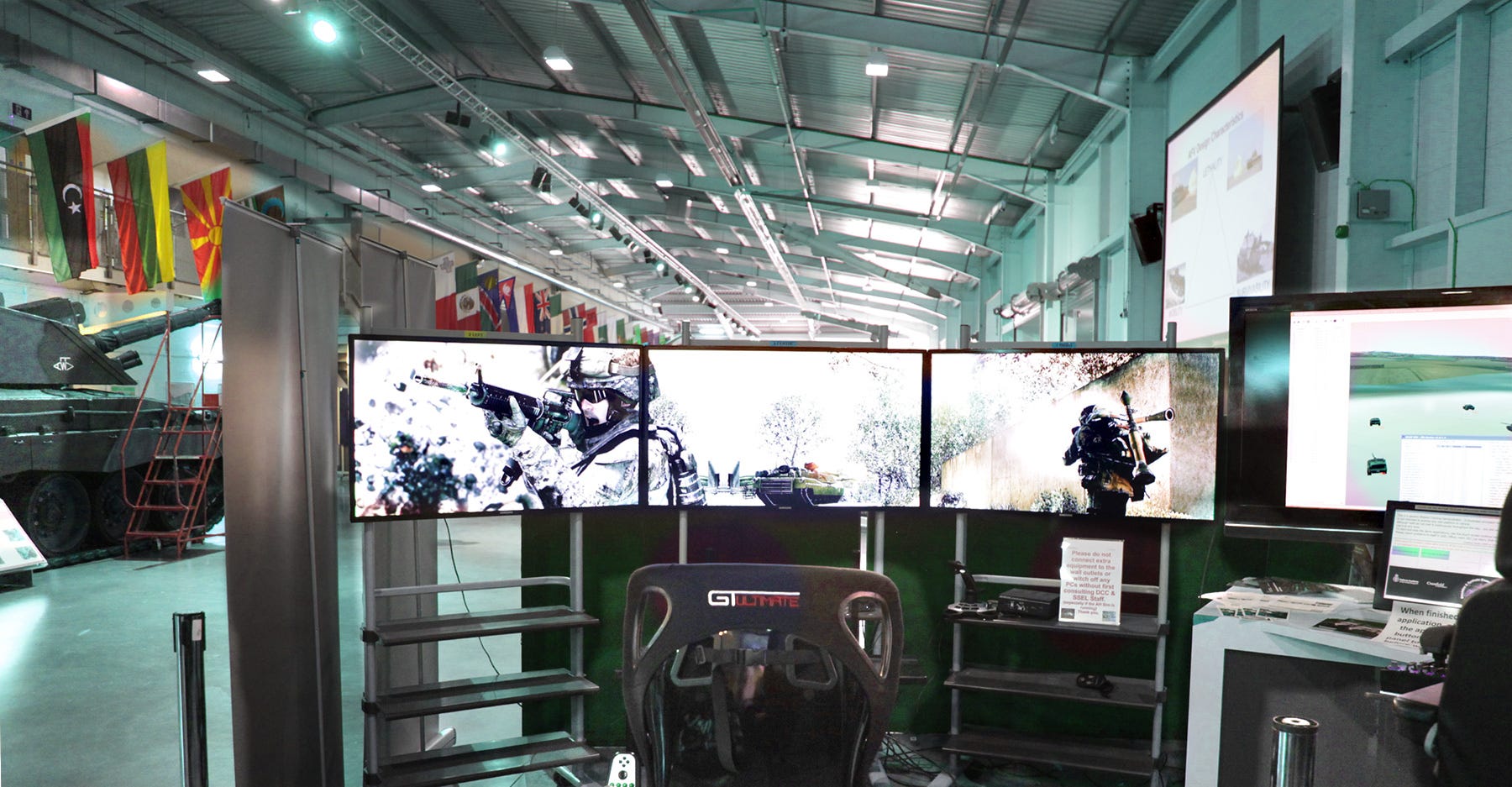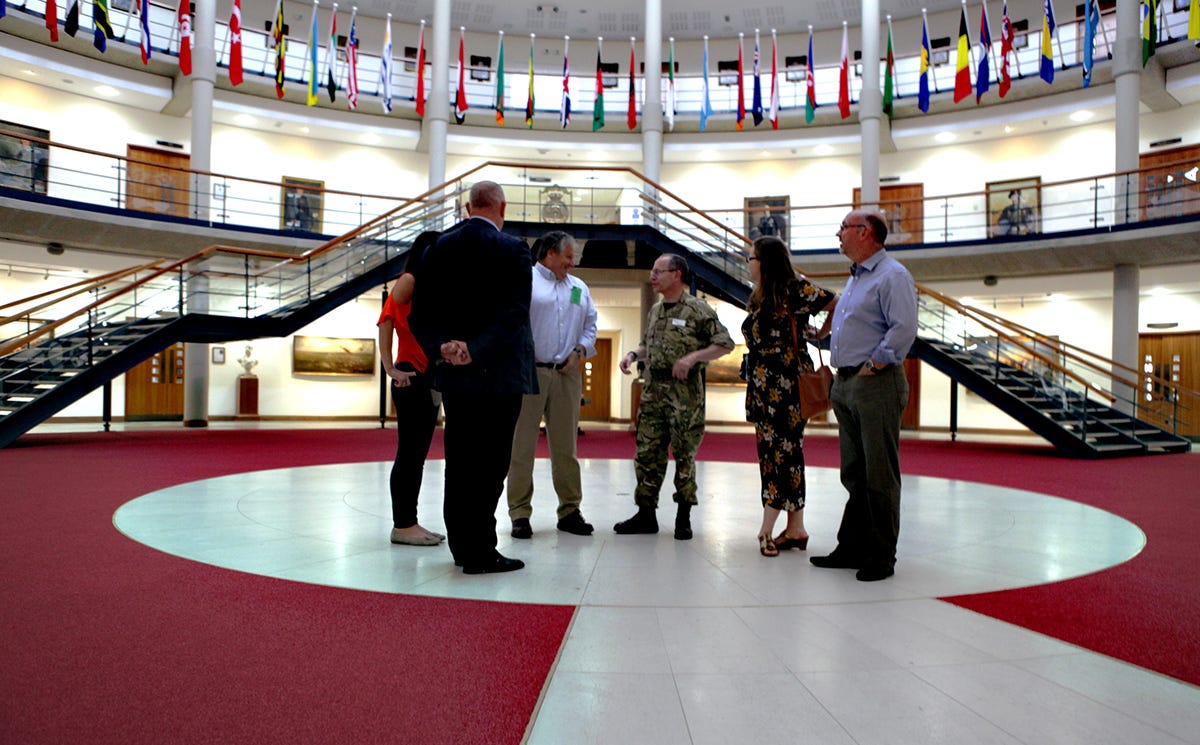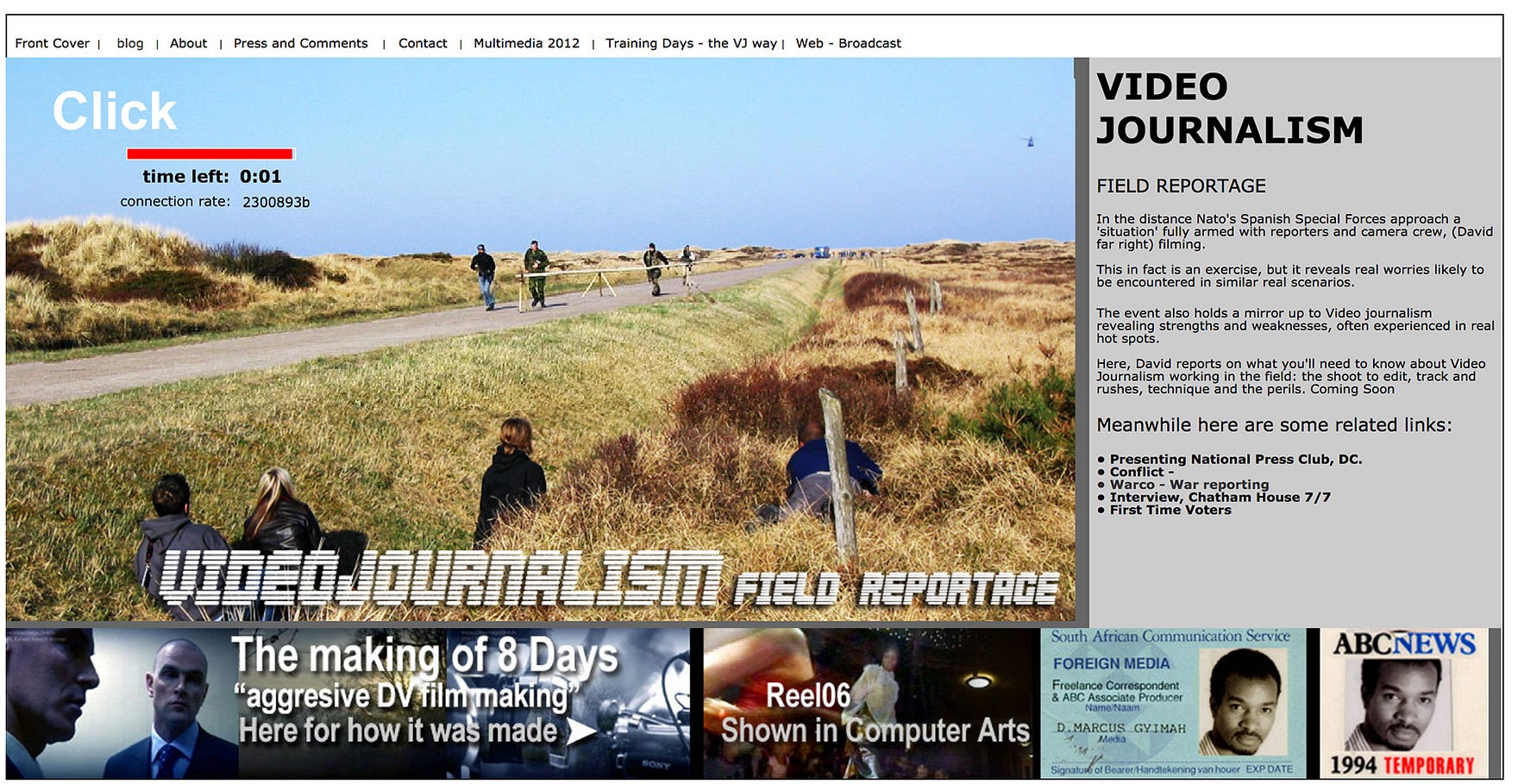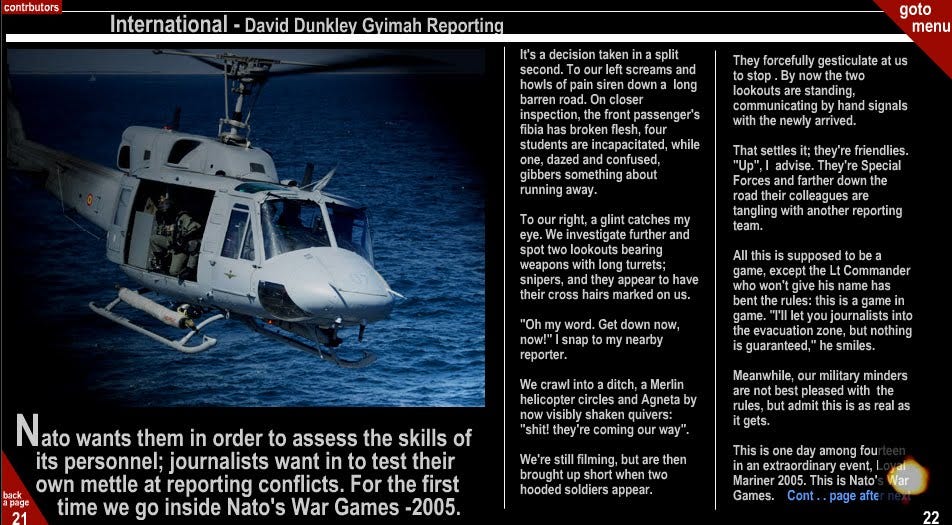
First person shooter games on the Academy’s campus. To the left a
£4m Challenger Tank and on both sides lay an assortment of military
hardware.
Tucked away in the leafy South West of England, secured from neighbours and behind high security paraphernalia is an academy which, amongst its many offerings, specialises in gaming and simulations.
MBA elite universities,FTSE 100 conferences, Nintendo; few can rival this place where simulations and scenario planing carry consequences that go far beyond exam certificates and commercial imperatives.
On campus, software gizmos and million pound simulators wrestle for attention amid a spectrum of military hardware, such as the £4m Challenger 2 Tank, and rooms called “The JFC Battle Lab Simulation and Synthetic Environment Lab”.
We’re inside the UK’s Defence Academy. It’s where Bond would come if he lived in the real world. Today, Major Tom Mouat MBE a specialist in gaming, modelling and simulation is briefing his visitors the Guild of Entrepreneurs on the importance of gaming.
…to play a game is the quickest way to showing the emperor has no clothes and getting past that group think where the boss goes “so we’re all agreed then” and inside you’re saying “Oh my God”, but no one has said anything so you’re not going to say anything.
As an ice breaker, Guild members, like cohorts entering the academy’s programme, are introduced to a multi-player game. Six people to a team with just about enough instructions to take up a station are given specific tasks: Captain, Helm,Weapon Control, Science, Engineering, and Communication. The objective is to destroy enemy ships and dock with their own stations to replenish fuel.

“Yes! You guessed it” Major Mouat says in a jovial raconteur tone, referencing a popular galactic space franchise, except, this game wasn’t designed by Director JJ Abrahms or the team behind Grand Theft Auto. On the contrary, it looks like a throw back to Atari’s Space Invaders. Our last piece of advice: “If you don’t talk to each other, you’re all going to die”.
At first there’s a momentary stasis of inactivity, and then the room becomes a symphony of different voices.
“Bearing 270 degrees”, says the helm’s steerer.
Load weapons. Weapons armed. Lock.
“Have you fired yet?” asks the captain, “we’re being surrounded”.
Weapons deployed comes the response.
But there’s an immediate problem. Major Maout peering over points out, you’re not far enough from the blast effect of the nuke. You’ve about five seconds and you’re all dead.
Twenty-five minutes on and it’s all over. The value in this game the Major says surpasses many other expensive simulators. “Did you care about the graphics”, he asks. “No”, is the chorus in reply. Artemis cost $40 but it’s the affect it has on players compared with shoot em up games that’s intriguing. Simulation by itself though has no inherent value. How it’s used; the supervisor and support network is what makes all the difference. Major Mouat’s knowledge, a quick search online shows, is highly prized and sought after.
Later we’ll play another game where the Major has now upped the ante, which in psychological language references cognitive loading. Separate teams will come together to solve a larger puzzle.
Different people, have different skills and are suited for different jobs. You find out very quickly who those are when they’re cognitively loaded….We test everyone entering the army, he says.

Cognitive balancing
Two of the most famous psychologists whose work involves cognitive loading and stress testing is the Nobel laureate Daniel Kahneman and his colleague Amos Tversky. Their work captured in the riveting read “The Undoing Project: A Friendship That Changed Our Minds”, by Michael Lewis, and Kahneman’s book Thinking Fast and Slow, shows just how fragile the mind is and how we’re prone to react when under stress.
People are more likely to be selfish studies have shown, or yield to temptations. It’s the reason why when you’re under stress a bar of chocolate become alluring — when you’ve promised yourself you’re on a diet. Further revelations link attention and intelligence. In a test by University of Oregon researchers they found that training attention with children increased their ability to attain their goals and raised their intelligence, and that genes played a part in this, as did parenting techniques in controlling attention and emotions. Are people born leaders?
“You quickly spot potential commanders”, says Major Maout, referring to Artemis “There the ones who end up walking around looking at other’s screens”. And that’s the point with the barest of information about completing a task, what do you do? If you find yourself in a tight spot, do you improvise your way out of it, or give up? And what happens when the problems mount? Where’s your limit to when you might give up?
As a lecturer I frequently witness this when I’d simulate a newsroom strategised around agile and sprint productions. The objective is to see how potential journalists could work with each other, as well as, how adaptive they are to fresh levels of cognitive loads as they accomplished new tasks.
Gaming isn’t what you think
Today’s show is one of a variant cohorts on the academy’s diploma or MSc programmes are likely to encounter. To give it it’s full name war gaming is big business, comes in many forms and dates back millennia. Benjamin Jensen of real clear defence writes,
The popular game chess dates back to ancient India where it was called chaturanga, a Sanskrit name for an epic army. The game, a simulation of war involving warfighting functions and formations of its day, helped rulers and their advisors visualize and describe military problems while practicing new schemes of maneuver.
Jensen documents one of the more prominent advocates of war games General Von Moltke who used maps for gaming to mobilise Prussian forces adapting to new warfare. More recently, the US secretaries of the military departments in a memo voiced concern at “the need to reinvigorate, institutionalize and systemize wargaming across the department”, whilst the China people daily online cited:
China’s armed forces are stepping up combat adverserial training and war games in a bid to make up for diminishing.
The label “War gaming” is itself a misnomer, because it isn’t necessarily about war. It’s about the following from the Major’s powerpoint slide:
It is about practice, an attitude of mind, getting input from everyone, exploring ways to make the other guy fail, an organisation that values innovation, and a clear understanding of “what do we want to achieve?
Scenario planning and simulation envelope one of the more prominent methods in boardrooms, matrix games. Here, minimal rules and players continual test “what if”? What happens when there is no Brexit deal? If Trump turns the rhetoric on Iran, what next? Or a cheese company finds a new pretender eating into its market? Yes, one of the most successful war gamers is a cheese brand, we’re told.
Nato War Games


Then there’s full scale gaming. In 2005 joint forces working under Nato launched Loyal Mariner — a war games programme in Northern Europe of some logistical spectacle. As a former conflict reporter, working in South Africa in the early 90s, I was appointed field editor, and as indicated from this archive (above) from my online story platform, viewmagazine, our job was to test army personnel’s handling of a new type of multimedia journalist. One in which the subject couldn’t make a mistake mid flow, and be guaranteed the story wasn’t already being viewed on monitors. The days of, “can I start that again?”, had passed, as one senior commissioned officer discovered.
How real was it? In this short excerpt you can hear how terrified one of the reporters has become when a helicopter circles us in the field.
Back inside the Defence Academy, a third of the day is drawing to a close. There’s more to come, yet so far you get the impression that Guild members have been utterly consumed by the morning events. Some ideas about adding value to the game with the new personnel have been met with approval by the Major. “What do you know?” says one member. Trust entrepreneurs to look for ways of innovating.


The author Dr David Dunkley Gyimah heads up the disLAB was a guest of Lee Robertson, the present Master of the Guild of Entrepreneurs at the time of writing.




